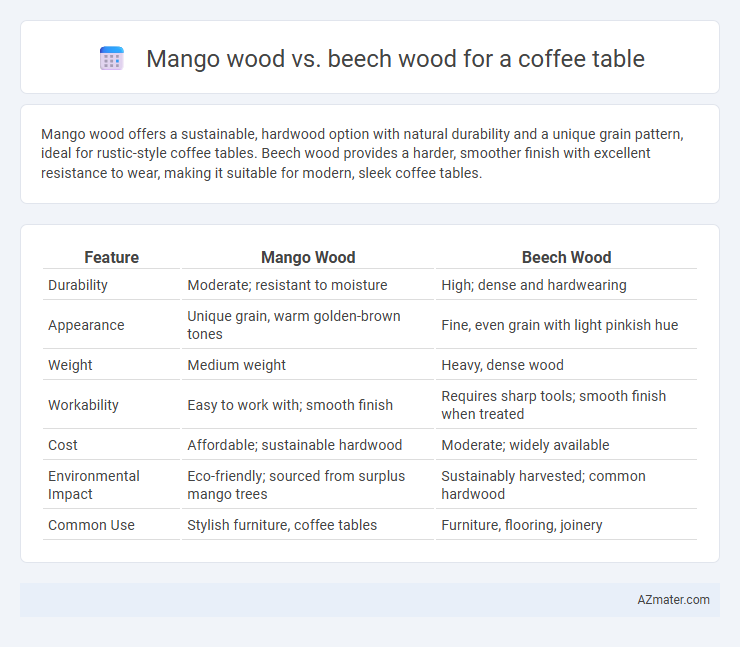Mango wood offers a sustainable, hardwood option with natural durability and a unique grain pattern, ideal for rustic-style coffee tables. Beech wood provides a harder, smoother finish with excellent resistance to wear, making it suitable for modern, sleek coffee tables.
Table of Comparison
| Feature | Mango Wood | Beech Wood |
|---|---|---|
| Durability | Moderate; resistant to moisture | High; dense and hardwearing |
| Appearance | Unique grain, warm golden-brown tones | Fine, even grain with light pinkish hue |
| Weight | Medium weight | Heavy, dense wood |
| Workability | Easy to work with; smooth finish | Requires sharp tools; smooth finish when treated |
| Cost | Affordable; sustainable hardwood | Moderate; widely available |
| Environmental Impact | Eco-friendly; sourced from surplus mango trees | Sustainably harvested; common hardwood |
| Common Use | Stylish furniture, coffee tables | Furniture, flooring, joinery |
Introduction to Mango Wood and Beech Wood
Mango wood is a sustainable hardwood known for its durability, vibrant grain patterns, and resistance to moisture, making it ideal for rustic or eclectic coffee tables. Beech wood, recognized for its pale color and fine, even texture, offers excellent strength and smooth finish, perfect for modern and minimalist coffee table designs. Both woods provide distinct aesthetic and structural qualities, catering to different interior decor preferences and functional demands.
Appearance and Grain Patterns
Mango wood features a distinctive, warm golden-brown color with darker streaks that create a rich, uneven grain pattern, giving each coffee table a unique and rustic appeal. Beech wood, on the other hand, exhibits a pale cream to pinkish-brown hue with a fine, straight grain that offers a smooth and uniform appearance, suited for modern and minimalist designs. The irregular grain and natural knots in mango wood provide a more textured, artisanal look, while beech wood's consistent grain lends itself to sleek, polished finishes.
Durability and Strength
Mango wood offers moderate durability with a Janka hardness rating of about 1,070, making it resistant to dents and scratches for a coffee table. Beech wood is denser and stronger, boasting a higher Janka hardness around 1,300, which provides superior durability and structural stability over time. Choosing Beech wood ensures better resistance to everyday wear, while Mango wood delivers a more affordable, eco-friendly option with decent strength.
Sustainability and Environmental Impact
Mango wood is a sustainable choice for coffee tables due to its rapid growth rate and use of trees that have completed their fruit-producing cycle, reducing deforestation. Beech wood, while durable, often comes from slow-growing forests, leading to higher environmental impact and less sustainable harvesting practices. Choosing mango wood supports eco-friendly furniture production by utilizing a renewable resource with a lower carbon footprint.
Maintenance and Care Requirements
Mango wood requires regular oiling to maintain its natural luster and prevent drying, while beech wood benefits from periodic polishing to keep its smooth surface and resist moisture damage. Both woods should be cleaned with a soft, damp cloth, avoiding harsh chemicals to preserve their finish and durability. Mango wood's natural hardness provides better resistance to scratches compared to the softer beech wood, which may need more frequent touch-ups or refinishing over time.
Cost Comparison
Mango wood coffee tables typically cost less than beech wood options due to the faster growth rate and abundant availability of mango trees. Beech wood is generally pricier because of its hardness, durability, and slower growth, which increases the material expense and production cost. Choosing mango wood offers a budget-friendly alternative without sacrificing reasonable durability for a coffee table.
Weight and Workability
Mango wood is lighter than beech wood, making the coffee table easier to move and handle during assembly. Beech wood offers superior workability due to its fine grain and hardness, allowing for smoother finishes and precise detailing. Weight considerations favor mango wood for portability, while beech wood excels in durability and intricate craftsmanship.
Suitability for Modern vs. Traditional Décor
Mango wood offers a warm, rustic appeal with unique grain patterns, making it ideal for modern coffee tables that emphasize natural textures and eclectic design. Beech wood, known for its smooth, fine grain and uniform light color, suits traditional decor by providing a classic, polished look that complements ornate or vintage styles. Both woods are durable, but mango wood's organic aesthetic aligns better with contemporary interiors, while beech wood supports more formal, traditional settings.
Pros and Cons of Mango Wood Coffee Tables
Mango wood coffee tables offer eco-friendly sustainability and durability, featuring a rich, warm grain that enhances rustic or contemporary decor styles. They resist scratches and moisture better than many hardwoods but can be softer compared to beech wood, which is denser and more resistant to wear. Mango wood requires regular maintenance to prevent drying and cracking, whereas beech wood offers greater stability and hardness but lacks the unique character of mango wood's natural color variations.
Pros and Cons of Beech Wood Coffee Tables
Beech wood coffee tables offer a smooth, fine grain that provides durability and resistance to wear, making them ideal for everyday use in living spaces. Their light color and ability to take stains well allow for versatile finishes, blending seamlessly with various interior styles. However, beech wood is prone to warping and swelling in high humidity, and it can dent or scratch more easily compared to harder woods like mango or oak.

Infographic: Mango wood vs Beech wood for Coffee table
 azmater.com
azmater.com